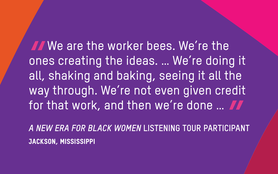Down to the wire, the 117th Congress passed two new protections that will help mothers avoid having to choose between their health and their job.
If you weren’t glued to C-SPAN in late December, you may have missed it. Before Congress headed home for the holidays, it passed major—and long overdue—civil rights legislation that will advance racial, gender, and economic equality.
After more than a decade of persistent advocacy and organizing by workers (especially working women), the Pregnant Workers Fairness Act (PWFA) was finally passed into law. When it takes effect in June, it will fix glaring gaps in federal anti-discrimination protections that left millions of pregnant and postpartum workers without access to reasonable accommodations.
These accommodations? Well—brace yourself—things like the opportunity to drink a bottle of water, wear maternity pants, or request light duty.
Now, employers will be required to make reasonable accommodations for workers who need them because of pregnancy, childbirth, and related medical conditions (unless the accommodation would cause undue hardship for the employer). And, workers are protected from retaliation by their employer.
Improvements on previous laws
Prior legislation didn’t protect most workers who needed pregnancy-related accommodations. The Pregnancy Discrimination Act of 1978 required workers to find a similarly situated employee who had already been given an accommodation; the Americans with Disabilities Act only covered pregnancy-related disabilities.
Some states and localities passed laws to fill the void, but many were left unprotected; moms and working families suffered from gaps in these federal protections, often forced into dangerous working conditions or losing income as a result of pregnancies.
The moms who organized to pass PWFA, in concert with the advocates at A Better Balance, have harrowing stories about how the lack of workplace protections—and the resulting discrimination—caused sometimes lasting harm. They were forced off the job when they requested light duty, and driven into poverty when they had to take unpaid leave to deal with pregnancy complications.
When Armanda Legros asked her employer to give her a break from heavy lifting after she pulled a muscle during her pregnancy, her boss pushed her out; she lost her health insurance, and she had to rely on SNAP (food stamps) to feed herself and her kids: “Once my baby arrived, just putting food on the table for him and my four-year-old was a challenge. I was forced to use water in his cereal at times because I could not afford milk. I was scared every time I looked in my empty fridge.”
A long road to passage through Congress
This commonsense legislation long enjoyed bipartisan support (it passed the House 315-101), but it took the insistence of an intersectional movement to get to a vote in the Senate. Over 125 mothers from 42 states published a powerful ad in the New York Times in October, urging Senate Majority Leader Chuck Schumer to prioritize bringing PWFA to a vote before the end of the 117th Congress.
As the midterm elections came and went, advocates fought harder than ever to get the Senate to prioritize PWFA in the lame-duck session.
Then, three days before Christmas, the Senate passed a $1.66 trillion omnibus spending bill—with the PWFA attached. Attempts to water down PWFA’s protections via amendment failed. The bill popped back over to the House, which passed it before sending it to the president’s desk.
Also tucked into the omnibus was another major piece of legislation that will enhance equity in the workplace and beyond: the PUMP for Nursing Mothers Act will expand the right to adequate time and space to express and store breastmilk at work. Without those rights, breastfeeding workers often face harassment, lost wages, and job loss.
These laws are a major victory for people who are pregnant and will become pregnant, and working families across the country. But they are especially important for people struggling to make ends meet, or working without access to paid sick and family leave, or raising kids on a single income, or laboring in physically demanding, low-paying jobs.
Countless pregnant and postpartum workers, especially those in low-wage jobs (where women of color are disproportionately represented), have been forced over the years to choose between their health and a paycheck because of these gaps in federal law.
Simply put, we’re celebrating these laws as a victory in the fight for equality in the workplace and beyond.



